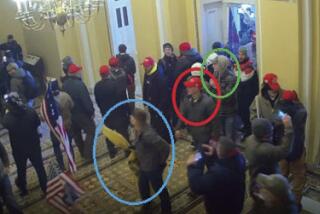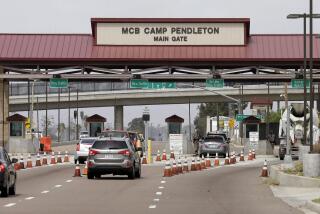Bye-Bye Mess Duty : Marines Looking for a Few Good Potato Peelers
- Share via
CAMP PENDLETON — Flanked by piles of dirty dishes deep in the bowels of a chow hall, Lance Cpl. Jeff Frye looked like anything but a battle-tough Leatherneck preparing to defend his country. It was the 20-year-old Marine’s turn at mess duty and he simply wasn’t enjoying it.
“It’s no fun at all,” Frye said, adjusting a row of plates into formation between the plastic prongs of a green dish rack. “Everyone dreads getting mess duty.”
Frye’s duty at the dishes--like that of his counterparts busing tables or scooping gobs of food onto the plates of hungry enlisted men--has been as much a part of Marine Corps tradition as raising the flag over Iwo Jima. Inglorious as it may seem, mess duty has been with the Marines since this nation’s elite fighting corps was established more than two centuries ago.
But that may end soon.
Camp Pendleton officials hope to replace the enlisted personnel normally saddled with mess duty with civilian workers hired as part of a proposed multimillion-dollar program, which is awaiting final funding approval from Marine headquarters in Washington.
The change is proposed in conjunction with a move to eliminate mess duty for enlisted personnel at Marine Corps bases across the country. If it gets the final blessing of top Marine Corps officers, the troops at Camp Pendleton could be relieved of mess duty by October.
In Southern California, civilian cafeteria workers are scheduled to be brought on board not only at Camp Pendleton but at the Marine Corps Air Station at El Toro in Orange County.
Marine Corps brass contend the switch would help increase the productivity of their troops by reducing the drain on manpower from infantry divisions and secretarial pools alike, allowing rank-and-file Marines to continue training or taking part in the jobs they normally tackle. Moreover, they say, it should dramatically boost morale.
“My personal view is it’s a big plus,” said Col. Harry Solter, assistant chief of staff for logistics at Camp Pendleton. “We have what amounts to two infantry companies doing mess duty each day. When you put all those people back in the foxhole, so to speak, you’re not only helping to keep them in training but sure eliminating a real source of contention.”
Indeed, like Frye, most Marines assigned to mess duty readily acknowledge that they’d prefer doing just about anything else.
“It’s a lot of hard work,” said Frye, a Minnesota native who normally works in the base’s personnel administration office. “You have to work weekends. When holidays fall around, you have to work them, too. It’s not anything I’m going to miss.”
Cpl. Christina Enlow, 20, agreed.
“Nobody’s thrilled to be here,” said Enlow, from Ashtabula, Ohio. “Sure, we get the first food on the line, but it’s nothing to write home about.”
Enlow, who works at the base’s photography lab, said she is “not going to be sad at all” when mess duty is eliminated and wished that Corps brass would “do it today.” Nonetheless, Enlow stressed that most Marines, despite the gripes, grudgingly realize mess duty has always been a necessary link in the chain of life in the Corps.
“It’s not fun, but it has to be done,” she said.
About 280 enlisted men and women are tapped each day from their normal duties to help wash pots and pans, clean tables, dish up food and generally assist in the operation of Camp Pendleton’s 18 mess halls. If the change in mess duty is approved, civilians would take over such simple duties, but Marines would be retained as cooks or to oversee operation of chow halls.
Low-ranking enlisted personnel typically serve one 30-day stint each year on mess duty. Selection is based solely on need and not considered as a punishment, Marine officers say. Over the course of a year, more than 3,500 of the 28,000 Marines stationed at Camp Pendleton draw mess duty.
The hours are, to say the least, long. Mess personnel generally rise by 4:30 a.m. to help begin preparations for breakfast and are finished cleaning up after dinner by about 7 p.m., with breaks between the meals during the day.
Such requirements are particularly tough for married Marines. “With these hours, I hardly ever see my husband,” said Lance Cpl. Carla Harrison, an analyst at the base’s administrative control unit who is married to a Marine corporal.
Harrison said she fears that after being away from her normal duties for a month, it will be “hard to get back into the swing of things.”
Corps brass admit that mess duty is one of the least-loved chores of the average enlisted Marine.
“It’s not something most Marines exactly enjoy,” said Maj. N.M. Gardner, who oversees the base’s food services operation. “We’re very suspicious when we find a Marine who wants more mess duty.”
While the three other branches of the military all began supplanting enlisted personnel with civilian workers for mess duty after the Vietnam War, the Marine Corps has stubbornly held off making any change until now. As Solter sees it, the switch didn’t come sooner largely because of lingering fiscal concerns among top Corps brass and a feeling that mess duty was part of an enlisted man paying his dues.
Today, the proposal to drop mess duty for Marines is almost uniformly accepted by Corps leaders, he said. “You might find some old die-hards out there who say they had to do mess duty so others should have to do it,” Solter said. “Most, though, seem to think it’s a good idea.”
And for devout Marine Corps traditionalists saddened by the passing of mess duty, there remains a last glimmer of hope. Although enlisted Marines may soon be spared from the ordeal, most new recruits will still be required to serve a one-week stint on mess duty during boot camp.


